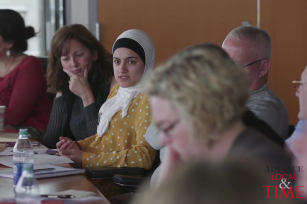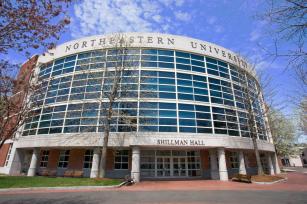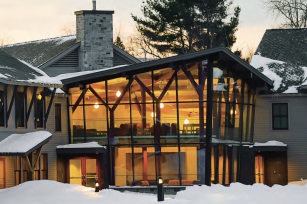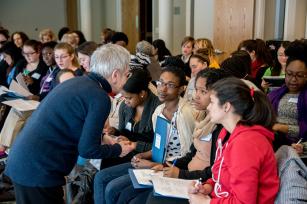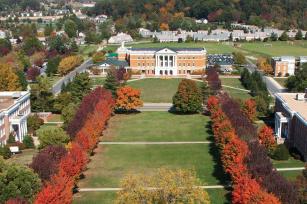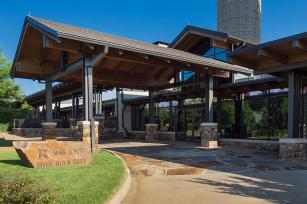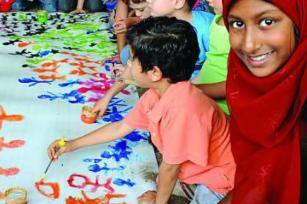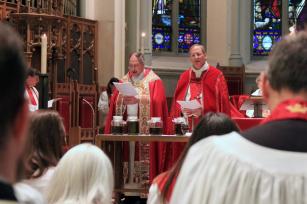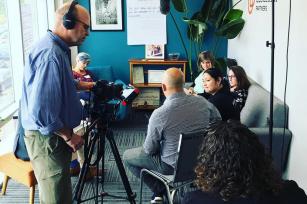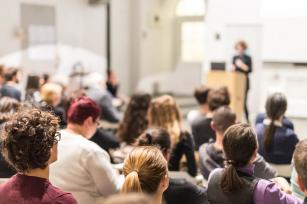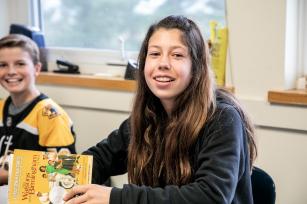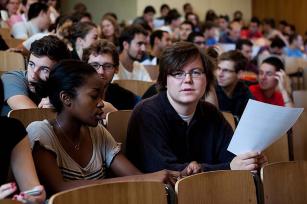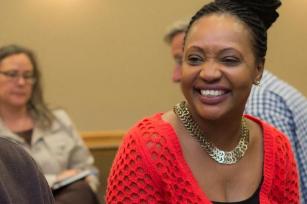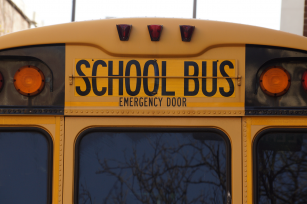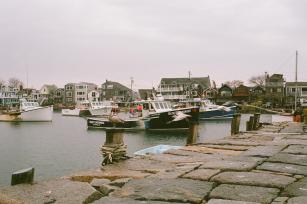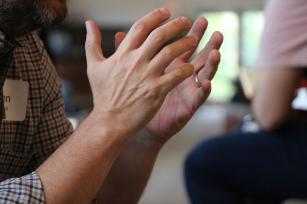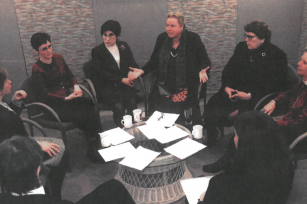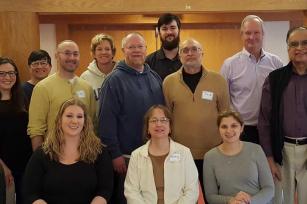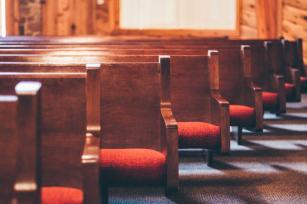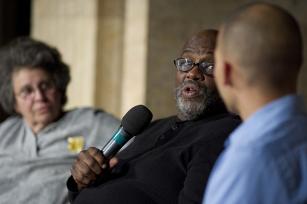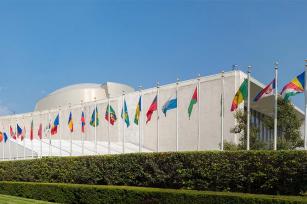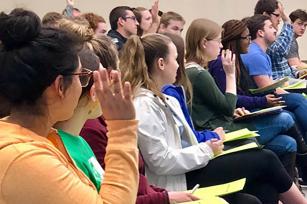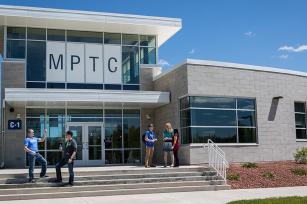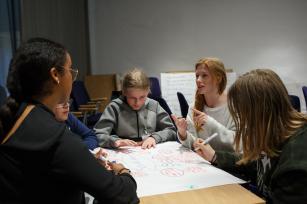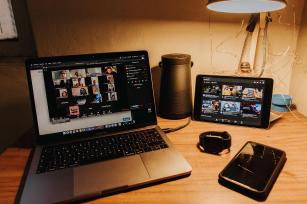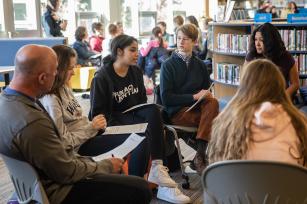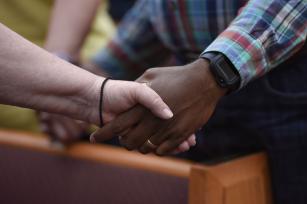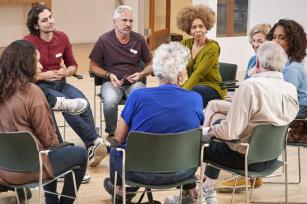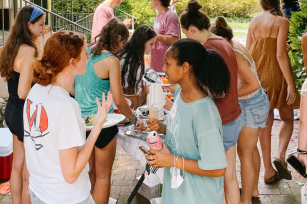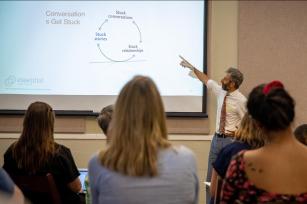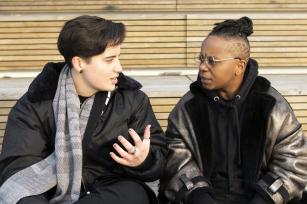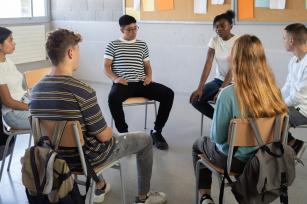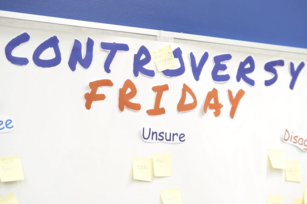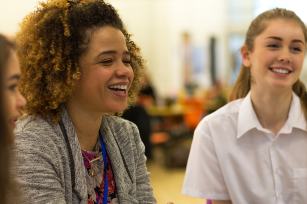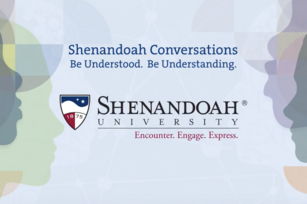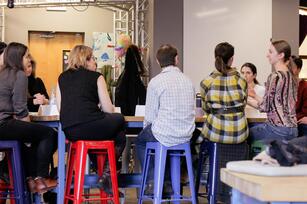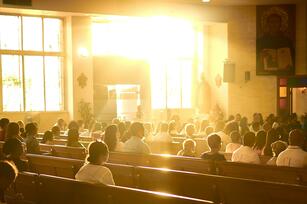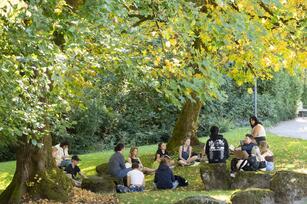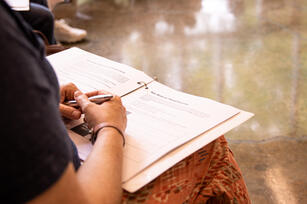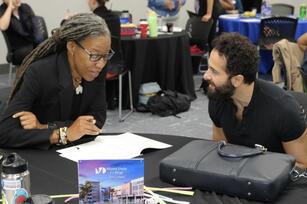
Breadcrumb
- Essential Partners
- Our Impact
- Impact Stories
- 2025 EP Community of Practice Summits
2025 EP Community of Practice Summits
In 2025, Essential Partners hosted three summer summits to strengthen and empower our Community of Practice (CoP). Led by our new CoP manager, Grace Boone, these events represent a unique dimension of EP’s impact—deeper connections, personalized support, and collaborative thinking.
One highlight of the summits was hearing directly from our partners about how they are applying Reflective Structured Dialogue in their specific contexts. We saw a variety of applications, from hyper-local grassroots community work to dialogue as a process to implement school policy.
Our CoP members come from foundations, secondary schools, higher ed campuses, community organizations, local governments, and nonprofits. Each attendee was at a different point in their journey with dialogic change-making. Some were just starting out. They shared lessons and conundrums from their first year. Others have been on this journey with EP for years already, bringing insights and innovations to offer.
This range of experiences provided a rich and dynamic learning environment for everyone.
Each summit included breakout groups and interactive activities to foster cross-collaboration and real-time learning. These created a generative space for participants to engage with new resources, new ideas, and mutual support. The emphasis on shared learning was a highlight for many attendees and affirmed our belief that the heart of our CoP work is to provide opportunities for our members to connect and share their real-world experience.
Participants expressed a strong desire for this type of sustained, meaningful connection within their specific sectors, both with their peers and with EP’s experts—and we're committed to making that a reality.
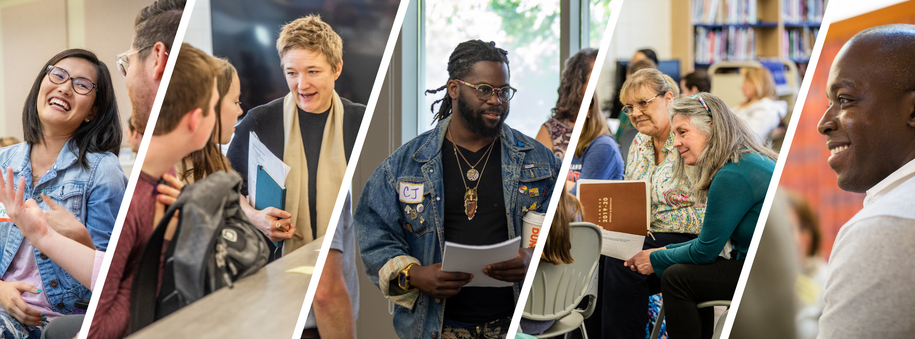
A New Approach to our Community of Practice
EP boasts a new visionary strategy for our Community of Practice over the coming year. Designed and led by Grace Boone, the plan is designed to create a more integrated and collaborative network of change-makers and bridge-builders.
Our new strategy will encourage members to engage in peer-to-peer learning, share best practices, address common challenges, and build a stronger sense of solidarity with others doing dialogic work. Those interested in learning more can contact Grace directly.
These summits underscored the importance of this shift. Participants consistently expressed a desire for more opportunities to connect with others who face similar challenges. The feedback we received at these summits will directly inform our new strategy, set to launch in September.
Nurturing Frontline Leaders
Spearheading dialogue movements can be challenging, and we believe in providing our CoP members with the support they need to stay motivated and engaged.
As a tangible expression of our gratitude, attendees of the Higher Education Summit received care packages due to available grant funding, which included EP merchandise and a copy of The Dialogic Classroom in Higher Education, a new book co-authored by three EP Academic Associates. This gesture of active care is a new way for us to honor the dedicated work of our community members, and we hope to create more opportunities for donors to support this initiative in the future.
Members of our global network feel less alone and more hopeful when they can connect with peers who understand their struggles and celebrate their successes. As one participant shared, "Connecting with other CoP members is recharging, inspiring, and affirming."
Spotlight: 2025 Community Leaders Summit
The Community Leaders Summit focused on using RSD to strengthen communities and equip them to address complex challenges. We explored key questions: How can we use dialogic processes to improve our relationships? How do we build a dialogic culture where we live and work? And how do we move from dialogue to community action?
Our time together was designed to be a space for hope and healing. We connected meaningfully with each other and learned from courageous leaders who are using our dialogic approach to transform their communities. The program featured three speakers:
- Hannia Preciado, Founder, President, and CEO of RÍE Coaching and Facilitation, who shared her work as a Community Cornerstone Fellow, which focuses on developing leadership and creating spaces for dialogue and rest.
- Amanda Chance, Associate Mission Director of the YMCA of Pierce and Kitsap Counties, who shared four key lessons she's learned from scaling dialogic practices both within her organization and in the broader community.
- Sepi Djavaheri, Director of Community Mobilizers at UJA-Federation of New York, who reflected on her experience launching interfaith dialogues with clergy on Long Island following October 7.
"[There are] so many ways to foster dialogue and build community,” reflected one participant. “You can go big and go small—both are so impactful." Another participant felt particularly inspired by the stories they heard: "The power and value of human connection exists everywhere."
Spotlight: 2025 Higher Education Summit
Our Higher Education Summit brought together faculty and staff who are applying RSD in classrooms and on campus. In this divided moment, the need to repair trust, deepen mutual understanding, and build new relationships across deep differences has never been more critical.
The summit was an interactive space for attendees to connect, share insights, and find solidarity with their peers. It featured innovative speakers who are using dialogic competencies in transformative ways on their campuses, along with practical resources and connecting activities. Three guest speakers joined our program:
- Dr. Cassie Majetic, Saint Mary’s College, who shared her experience launching a new first-year seminar program designed to help students transition to college-level intellectual life. The three-credit course centers on enduring questions and challenges within faculty members' disciplines, with dialogue and dialogic practice serving as the primary method for exploring contemporary issues.
- Dr. Noga Shemer shared how UConn has established a dedicated cohort focused on building a campus-wide dialogic culture, which successfully advocated for including dialogue as a formal competency in the new common curriculum. This coming year, they are focused on how to hold faculty accountable while ensuring buy-in, supporting a systematic approach to generate an authentic campus-wide dialogic culture.
- Dr. Danielle Torres shared how Lewis & Clark launched a campus-wide dialogue initiative in January 2023. This initiative has been successfully applied across complex campus contexts, including community dialogues for changing the school mascot, strategic planning conversations with faculty about institutional vision, and student-led symposia on race and gender. The program continues expanding into first-year experiences and seeks to support campus community members' own dialogue initiatives.
One participant felt reassured by the stories of meaningful impact. "Slow and steady is how change happens," they said. Another noted, "Connecting with other CoP members is recharging, inspiring, and affirming."
Spotlight: 2025 Secondary School Summit
For our Secondary School Summit, we learned from innovative educators and students working in their schools to strengthen students’ capacity for dialogue and connection.
There was a time to connect with and learn from one another, as well as to discuss how we want to stay engaged as a community in the months ahead. Practitioners from Hawken School and Cary Academy shared their experiences developing student-led dialogue cohorts, and Newburyport schools facilitated a community dialogue on cellphones in schools based on EP’s dialogic approach:
- One staff member and two students spoke about the 2025 Newburyport (MA) Cellphone Community Dialogue, focusing on how they used dialogue district-wide to create the circumstances to craft a policy that felt representative of the community’s perspective of cellphones in schools.
- One staff member and three students spoke about the Cary Academy (NC) Dialogue Facilitator Program, sharing how 47 student dialogue facilitators supported conversations that have fostered understanding and healing around contentious moments and topics.
- Two staff members and one student from the Hawken School (OH) Dialogue Initiative shared lessons for the first year of their dialogue initiative—in particular, how they embedded it into a humanities class and are working with the administration to scale up in the coming year.
“Dialogue is a means through which students build essential skills for life,” said one summit participant. Another was able to envision new ways to integrate RSD into their pedagogy: “[I plan to] continue to refine messaging and identify ways to embed dialogic moments into classroom spaces.”
We are inspired by the passion and commitment of our community and look forward to building on the momentum from these summits. Individual donor support makes Community of Practice programming possible, nurturing the people who work tirelessly and courageously to build a world of thriving communities strengthened by difference, connected by trust.
Related Impact Stories
Testimonials

Bob Bordone, Expert and AuthorEssential Partners does the best work in the field of dialogue and communication.
Harvard Negotiation & Mediation Clinical Program, Co-Founder

Megan DeFranzaHere safe space was created for pastors and church leaders to wrestle with topics like evolution which are all too often “off limits” or believed to be antagonistic to the faith.
Gordon College, Massachusetts

Windor DorkoAs a former rebel, I really believe that if we had known about dialogue, perhaps we would not have had a civil war.
Liberia

Becca Humphries ’21The dialogue setting created an environment where people weren’t afraid to open up and share those things that they might not always share out loud. It made us feel closer and provided a stronger sense of trust. It allowed me to be vulnerable to people outside of my community and to be open to sharing.
Cary Academy, NC

Gail AndersonWe became confident really early on that the model was working. We were nervous there would be yelling and blow-ups but after a few conversations we realized that wasn’t happening… People were treating each other humanely.
Minnesota Council of Churches

Undergraduate StudentI have never heard people talk so openly about race, especially in a class setting. Everyone was respectful and honest at the same time. The dialogue structure helped me learn about my peers and helped me feel more comfortable than I ever have about discussing controversial issues.
Gordon College, Massachusetts

Undergraduate StudentDuring one dialogue, as we were reading The Joy Luck Club, we were asked to discuss our relationship to America. There were students who grew up in the United States and also those who hadn’t—and I was surprised to hear that everyone had equally complex relationships with the topic.
I appreciated being able to hear and express the full depth of our own context before delving into a discussion about first-generation immigrants.
Gordon College, Massachusetts

Linda Gryczan, MediatorInstead of demonizing and dehumanizing the other, we built a deeper connection. The fact that we disagree matters much less. It matters much more that we are neighbors in this community.
Montana Mediation Association

Seth Karamage, MediatorI am amazed at what came out—the way people shared their stories. This is not like a role-play; it really touched me.
Interfaith Mediation Centre, Nigeria

Belle AbayaTogether, we married our ideas to create a dialogue model that took into consideration our young people’s particular needs, and our culture.
The Conflict Resolution Group Foundation, Philippines

Kim Davidson, OmbudsI’ve gained not only confidence but tools. The Essential Partners training was worth every penny.
Oberlin College, Ohio

Undergraduate StudentThe professor was able to engage every student. She encouraged them to present new ideas. Dialogue helped create an environment that really deepened the understanding of the material.
Southern Methodist University, Texas

Undergraduate StudentDialogue challenged us to think more deeply about the class topics. Talking about our own thoughts and experiences in relation to the topic also challenged us to think about our own views and articulate them more clearly.
Gordon College, Massachusetts

Katie Shear, Civic Engagement CoordinatorUsing what we learned from Essential Partners, staff were able to model effective and respectful communication for students. A next step would be for us to help students employ some of these methods themselves. The staff not only gained skills in communication but also left feeling supported by each other in the work that we do.
Southern Vermont College, VT

Program ParticipantBefore, I thought all dialogue that does not culminate in solution was considered equivalent to failure. Now I see that dialogue is a stage complete in itself.
Burundi

Cricket Fuller, The Christian Science MonitorThis wasn’t a policy debate [about guns]. Instead, two people whose backgrounds and views diverged in almost every way possible shared a moment of honesty that struck at the heart of the matter.
Boston, Massachusetts

Cricket Fuller, The Christian Science MonitorThis wasn’t a policy debate [about guns]. Instead, two people whose backgrounds and views diverged in almost every way possible shared a moment of honesty that struck at the heart of the matter.
Boston, Massachusetts

Paul Schupe, Hancock United Church of ChristIt’s amazing how closely we can work together on certain projects and never know what about our faith motivates our work. This work deepened my appreciation for everyone who was there; hearing everyone's stories helped me to appreciate them more and the depth of their convictions, even when they’re convictions I don’t share.
Lexington, Massachusetts

Program ParticipantWhile our differences remain, the relationships between us have been strengthened and deepened. We have gained in mutual respect, affection, and appreciation of one another as followers of Jesus and fellow-bishops.
Anglican Community & Human Sexuality Retreat

Etionette Nshirmirimana, Burundian Master TrainerI realized that by using the “dialogue” approach, people could talk of what is deep in their heart, especially things that have harmed them.
Burundi

Kimberly Shaw, EducatorStudent facilitators flip the script. When students lead, you can see a change occur, a shift as they understand the difference between being a participant and being a facilitator, as they work to hear and address the needs of their classmates and community.
North Carolina

Kim Davidson, OmbudsI’ve gained not only confidence but tools. The Essential Partners training was worth every penny.
Oberlin College, Ohio

High School StudentThe thing that surprised me, was the amount of respect given to each person while speaking in the meeting. I thought that discussing politics would eventually cause problems, but it did not.
Raleigh, NC

Etionette Nshirmirimana, Burundian Master TrainerI realized that by using the “dialogue” approach, people could talk of what is deep in their heart, especially things that have harmed them.
Burundi

Alex Lyford, Assistant Professor of StatisticsI can't possibly overstate the positive effects the Dialogic Classroom training had on the curriculum and approach to my Introduction to Data Science class. The difference in the course from a year ago and now is night and day. My lectures are now filled with meaningful discussion and discourse—often related to sensitive topics that I wouldn't have dared touching without the training. Student feedback about these discussions has been overwhelmingly positive, and there is no chance that I would have had the wherewithal or initiative to revamp the course in such a dramatic manner without the training.
Middlebury College

Misty Stoll, School Board TrusteeI ran for my local school board in 2018 and was elected. I use the skills in our meetings, whether I’m chairing the meeting or not. This makes the meetings much more productive. We don’t go over the same topics over and over again.
Wyoming

Sophia Hopper ’24Dialogue changed how I think about the way my school runs.… now I know the people running this institution. I know their values. I know their story. There's a whole new level of trust in the institution itself.
Ravenscroft School, North Carolina

Cat Anderson, EducatorIt's incredible to really see the evolution and the change of these students, once they're given the tools—and Essential Partners has really helped me do that.
Boulevard Academy, Oklahoma

Nicki Glasser, Policy CoordinatorWhat surprised me was how much you could transform a relationship during a three-hour conversation.
Transformation Center, Massachusetts

Becca Humphries ’21The dialogue setting created an environment where people weren’t afraid to open up and share those things that they might not always share out loud. It made us feel closer and provided a stronger sense of trust. It allowed me to be vulnerable to people outside of my community and to be open to sharing.
Cary Academy, NC

Seth Karamage, MediatorI am amazed at what came out—the way people shared their stories. This is not like a role-play; it really touched me.
Interfaith Mediation Centre, Nigeria

Janet Bixby, Director of Community Dialogues“Essential Partners has the magic sauce—its trainings. Working with Essential Partners and Community Dialogues has enabled us to say, ‘Hey, we have tools to help us be able to do this, and we have ways to do this. We can address these things.’ That's been incredibly useful and powerful.”
Lewis & Clark

Program ParticipantI felt an amazing sense of accomplishment when the Essential Partners training ended; that I'd done something important for my community and something important for me.
Massachusetts

Dr. Brooke Vuckovic, Clinical Professor of Leadership“The Dialogic Classroom is by far and away the most skillful and thoughtful professional development I have had in years as an educator.”
Kellogg School of Management

Program ParticipantI did not anticipate having as many concrete takeaways as I do. I feel there is an immense practical application.

Andrew Wulf, PrincipalThe community dialogue was instrumental in helping us create a new policy around class rank. Though a controversial topic in the community, the dialogue EP helped us run ensured all voices were heard and valued. Regardless of how people felt with the final result, one parent summed it up best for us, ‘sometimes the process is more important than the outcome’.
Newburyport High School

Cricket Fuller, The Christian Science MonitorThis wasn’t a policy debate [about guns]. Instead, two people whose backgrounds and views diverged in almost every way possible shared a moment of honesty that struck at the heart of the matter.
Boston, Massachusetts

Program ParticipantI did not anticipate having as many concrete takeaways as I do. I feel there is an immense practical application.

Bob Bordone, Expert and AuthorEssential Partners does the best work in the field of dialogue and communication.
Harvard Negotiation & Mediation Clinical Program, Co-Founder

Belle AbayaTogether, we married our ideas to create a dialogue model that took into consideration our young people’s particular needs, and our culture.
The Conflict Resolution Group Foundation, Philippines

Program ParticipantThe highlight for me was the interconnectedness of the participants’ views, mutual respect, and range of experiences within the group
Montana

Undergraduate StudentI learned a lot about myself from others’ perspectives—it was comforting to hear similar values and ideas expressed, yet really eye-opening and intriguing to hear very different philosophies.
Dartmouth College, New Hampshire

Bill Scott, Project DirectorThere was a remarkable change in the way we were able to communicate with one another following the facilitated conversations.
Massachusetts Department of Mental Health

Jonathan Noyalas, Director of the McCormick Civil War Institute“RSD has been the most transformative thing in my 21 years of teaching. … Students have a greater desire to open up in class about things because they know that a Noyalas class is a safe environment. ‘I can say things here. I’m not going to be judged. I understand I’m contributing to a broader conversation.’”
Shenandoah University

Kim Davidson, OmbudsI’ve gained not only confidence but tools. The Essential Partners training was worth every penny.
Oberlin College, Ohio

Program ParticipantI felt an amazing sense of accomplishment when the Essential Partners training ended; that I'd done something important for my community and something important for me.
Massachusetts

Synagogue Congregant“After Octover 7th, I used the Essential Partners Guide to Dialogues About Israel and Palestine to design the dialogue and develop prompts. I deployed the training I received from Essential Partners to lead a Reflective Structured Dialogue where participants could share stories, encourage curiosity, and approach one another with tenderness. … The dialogue programs at our synagogue were a resounding success. Members still hold very different perspectives, but those who disagree, even vehemently, have been able to maintain relationships. Those whose views fall between the extremes feel more able to share their perspectives. They see one another as members of a shared community once again.”

Belle AbayaWhat is special about Essential Partners' approach is that it promotes authenticity, reduces defensiveness, increases curiosity, and boosts connectedness.
The Conflict Resolution Group Foundation, Philippines

Program ParticipantI read this comment from the 14th Dalai Lama: "Every change of mind is first of all a change of heart.” It seems appropriate for what we are doing.
Bayview, Michigan

Program ParticipantI did not anticipate having as many concrete takeaways as I do. I feel there is an immense practical application.

Allyson Bachta, K-12 Educator and AdministratorEP's approach is flexible enough to support educators working across diverse contexts and parallels work that they are already doing to support students' social-emotional development, create trauma-sensitive classrooms and schools, and differentiate learning experiences to meet the needs of all learners.
Massachusetts

Program ParticipantI felt an amazing sense of accomplishment when the Essential Partners training ended; that I'd done something important for my community and something important for me.
Massachusetts

Undergraduate StudentI feel more comfortable participating in class and less defensive when other students disagree. And because I learned more from my fellow students about their views, I now feel less competitive with them than in other classes.
Bridgewater College, Virginia

Belle AbayaAuthentic conversations will lead people to reflect on their own thinking and transform their perspectives to include that of others.
The Conflict Resolution Group Foundation, Philippines

Kim Davidson, OmbudsI’ve gained not only confidence but tools. The Essential Partners training was worth every penny.
Oberlin College, Ohio

Lucinda Garcia, Researcher, Educator & AdvocateThe Dialogic Pedagogy Fellowship at Tufts University, in collaboration with Essential Partners, gave me transformative social-emotional learning and facilitation skills to support meaningful dialogue in the classroom. I’m excited to apply what I’ve learned to design questions that invite personal narratives, value-based discussion, and comfort with complexity—all in service of building a classroom climate where productive dialogue and engaged learning can flourish.

Secondary School TeacherEP's approach allows all the students in the room to speak and be heard, to think about different perspectives on the issue without getting into arguments or fights.
San Diego, CA

Misty Stoll, School Board TrusteeI ran for my local school board in 2018 and was elected. I use the skills in our meetings, whether I’m chairing the meeting or not. This makes the meetings much more productive. We don’t go over the same topics over and over again.
Wyoming

Program ParticipantThis is the best adult learning experience I have had in the past five years. I wanted to learn new skills—I did!

10th Grade StudentEP's questions of understanding exercise felt like the debate that we wish the presidential candidates would have—instead of having to listen to two old guys yelling over each other.
Ravenscroft School, NC

Cricket Fuller, The Christian Science MonitorThis wasn’t a policy debate [about guns]. Instead, two people whose backgrounds and views diverged in almost every way possible shared a moment of honesty that struck at the heart of the matter.
Boston, Massachusetts

Sepi Djavaheri, Community Mobilizers Director“The Essential Partners training has had a multiplier effect—not only did it enrich the Dialogue Across Faiths event itself, but it also equipped a cadre of local leaders with effective tools to lead ongoing, constructive conversations within and between their congregations.”
UJA-Federation of New York

Program ParticipantThis is the best adult learning experience I have had in the past five years. I wanted to learn new skills—I did!

Nicki Glasser, Policy CoordinatorWhat surprised me was how much you could transform a relationship during a three-hour conversation.
Transformation Center, Massachusetts

Megan DeFranzaThere is a need not only for safe space within our churches but for our church leaders who often feel alone, or who may feel their job could be at risk if they engage in controversial conversations. How are they to make safe spaces in their own congregations for healthy dialogue if they rarely experience safe space to do the same?
Gordon College, Massachusetts

Anjali Bal, Associate Professor of MarketingOne of the things that we talked about was the ability to hear another person’s point of view, even if our minds aren’t changed. We have to remember that any sort of movement is movement. If we don’t acknowledge small movement, then we just stay on two different sides, and it’s all black and white, and we don’t hear each other.
Babson College, MA

Undergraduate StudentI have learned how to not be offended and to be better prepared to receive other people's communication. You don't have to agree, but you can respect the other person.
Randolph College (VA)

Program ParticipantI felt an amazing sense of accomplishment when the Essential Partners training ended; that I'd done something important for my community and something important for me.
Massachusetts

Megan DeFranzaHere safe space was created for pastors and church leaders to wrestle with topics like evolution which are all too often “off limits” or believed to be antagonistic to the faith.
Gordon College, Massachusetts

Meirav Solomon ’20Dialogue not only teaches you how to interact and understand more deeply those around you, it also teaches you more about the world around you and yourself. I think dialogue is super important to my growth as a student, a global citizen and a human being. I have learned to listen, I have learned to speak out, I have learned how to access my stretch zone (where I feel uncomfortable speaking but not turned off) and I have learned where my limits are.
Cary Academy, NC

Janele Nelson, Mission DirectorIn these divisive times, Essential Partners has given my local YMCA and now the national YMCA a means to build bridges through dialogue, re-establishing foundations for constructive change to occur.
YMCA of Pierce & Kitsap Counties (WA)

Program ParticipantI am now open to new views and can moderate my impulse to debate or persuade others of different views
Montana

Karen Ramirez, Director of the CU Engage ProgramWe get more requests [for campus dialogue] than we could ever respond to.… I’m proud that our work on campus is actually kind of unusual, because it doesn’t support just one population. It supports everyone—students, staff, faculty, graduate students. I don’t know if there are other University of Colorado projects going on that hit all of our campus population.
University of Colorado, Boulder

High School StudentThe most significant thing I've learned in this program is that having an open mindset when listening to others' opinions different from yours to understand their perspective instead of finding the flaws to oppose their opinion to try and change their mind.
Raleigh, NC

Imam Sani IsahThrough this training, we will have more people in the stream of work that we do and become better equipped with the know-how, skills and techniques. But most important, together we will sow a seed that will germinate and become a source of the antidote to terrorism, fanaticism, bigotry and extremism.
Nigeria

Undergraduate StudentI notice that my classmates take much more care when speaking about people who practice other religions. They make fewer assumptions, and they’re more careful with their words to make sure to avoid unintentional connotations.
Bridgewater College, Virginia

Teresa Grettano, Associate Professor and Director of the First-Year Writing programFacilitated dialogue creates a classroom atmosphere in which exploring uncomfortable issues and asking difficult questions is an expected part of the process, and it allows students space to engage each other without fear of the vitriol common in our public discourse.
University of Scranton (PA)

Undergraduate StudentI learned to expect the best of my classmates, even when we don’t agree. I can’t write off their opinions anymore, despite our disagreements.
Bridgewater College, Virginia

Program ParticipantI am now open to new views and can moderate my impulse to debate or persuade others of different views
Montana

Program ParticipantThis is a different tool for engagement. It’s not about you, it’s about others. It involves the art of listening and sincerely talking from the heart
Interfaith Mediation Centre, Nigeria

Secondary School TeacherEP's approach has given me some tools to deal with what comes up in my classroom. I teach classes about charged topics. As I’m thinking about and exploring ways to broach these conversations with students, I use this.
New Jersey

High School StudentI can't even begin to explain the gratitude and fulfillment I felt from participating in this Essential Partners COVID-19 dialogue. It helped me better understand myself and what I hope to accomplish throughout this period of uncertainty.

Nicki Glasser, Policy CoordinatorWhat surprised me was how much you could transform a relationship during a three-hour conversation.
Transformation Center, Massachusetts

Noga Shemer, Associate Professor in Anthropology“Students come to university so they can think deeply about issues that matter. They are the future, and the stakes are high. They want spaces where they can think these things through.”
University of Connecticut

Andrew Wulf, PrincipalThe community dialogue was instrumental in helping us create a new policy around class rank. Though a controversial topic in the community, the dialogue EP helped us run ensured all voices were heard and valued. Regardless of how people felt with the final result, one parent summed it up best for us, ‘sometimes the process is more important than the outcome’.
Newburyport High School

Beth MendozaDialogue gets more results. It makes decision-making easier. It makes creating participation easier … our greatest organizational impact has been more contributions as well as more effective and efficient meetings.
Moraine Park Technical College, Wisconsin

Janet Harris, Winthrop Rockefeller InstituteThe learning we received from Essential Partners has helped us open up space for people to have difficult conversations in a different way. The more we do this, the more we realize that dialogue has to be a part of all our work.
Arkansas
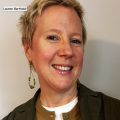
Lauren Barthold, Philosophy FacultyI’ve learned that it is not enough to announce my commitment to dialogue and expect students to know what I mean; I need concrete exercises to allow students to learn how to do it.
Endicott College, Massachusetts

Matthew Sandikie, Project PartnerThis has been quite different from other discussions in Liberia about peace. While many processes have been about how to reform ex-combatants, this was about how we may hold our own views but live together peacefully.
Liberia

Nicki Glasser, Policy CoordinatorWhat surprised me was how much you could transform a relationship during a three-hour conversation.
Transformation Center, Massachusetts

Megan DeFranzaThere is a need not only for safe space within our churches but for our church leaders who often feel alone, or who may feel their job could be at risk if they engage in controversial conversations. How are they to make safe spaces in their own congregations for healthy dialogue if they rarely experience safe space to do the same?
Gordon College, Massachusetts

Undergraduate StudentEvery opinion was accepted. No one felt judged or uncomfortable talking to one another. These have been, by far, the best classroom discussions I have ever had.
Bridgewater College, Virginia

Bob Bordone, Expert and AuthorEssential Partners does the best work in the field of dialogue and communication.
Harvard Negotiation & Mediation Clinical Program, Co-Founder

Janet Lansberry, Weissman Center Assistant DirectorThis was probably the most profound workshop that we ever brought to campus. It offered a really unique foundation in personal insight.
Mount Holyoke College, MA

Undergraduate StudentAt the beginning of the semester, there was not much participation in class. But by the end, almost everyone had something constructive to add every day.
Bridgewater College, Virginia

Anne Hopkins Gross, Dean of StudentsThe Essential Partners workshop was a way of building up our ability to talk about more difficult issues, such as poverty and GLBTQ safe spaces. It was really the foundational entrée into those more challenging issues of race, ethnicity, sexuality, and gender. People walked away feeling much more confident about having difficult conversations.
Southern Vermont College, VT

Clay Thornton ’21Having an environment that gives you that space to listen to others talk about their experiences and understand how those experiences have led them to the opinions that they have—it is truly eye-opening.
Cary Academy, NC

Ben Meoz, VP for Student Life and Dean of Students“We want to cultivate genuine curiosity among students so that they really open themselves to the needs of others and also feel like others have an awareness of what their needs and experiences are.”
Lewis & Clark

Program ParticipantThis is the best adult learning experience I have had in the past five years. I wanted to learn new skills—I did!

Peter Cooke, Immigration Dialogue ParticipantThere’s a real difference to people who are coming to meetings. They say, wow this is so different. They all said how people were more on the ball, more congenial. Now people see growing the economy as a way to unify the receiving community and immigrant communities.
New Hampshire

Teresa Grettano, Associate Professor and Director of the First-Year Writing programFacilitated dialogue creates a classroom atmosphere in which exploring uncomfortable issues and asking difficult questions is an expected part of the process, and it allows students space to engage each other without fear of the vitriol common in our public discourse.
University of Scranton (PA)

Rebekah Shrestha, SVPEssential Partners has played a catalytic role in our ability to facilitate dialogue time and time again, and we could not have done this work without them.
Belfer Center for Innovation & Social Impact and Office of Strategic Planning, 92NY

Vibhav Nandagiri ’21When a debate occurs, you never feel like you get to hear a person’s full point of view. But, through dialogue, you get to learn someone else’s perspective without any competitive need to win an argument. It leads to mutual understanding; listening to each other helps us chip away at our differences.
Cary Academy, NC

Rebekah Shrestha, SVPEssential Partners has played a catalytic role in our ability to facilitate dialogue time and time again, and we could not have done this work without them.
Belfer Center for Innovation & Social Impact and Office of Strategic Planning, 92NY

Amy Cottrill, Birmingham-Southern CollegeThe past few years in our country have been the most divisive and alienating in my lifetime, which can be a tremendous challenge in the classroom that aims for community, shared experience, and listening with empathy to opinions that are different from one's own. The Essential Partners workshop I attended provided invaluable tools to meet the challenges of teaching today. It helped me reimagine the classroom as a place to help students learn the essential tools of living and learning in community and interconnection, skills that are necessary in every single area of life. I have no doubt that my teaching has been dramatically reshaped in light of my introduction to structured dialogue and I feel like I have so much more to offer my students because of that.
Birmingham, AL

Undergraduate StudentAs a pharmacy major, I do not receive much training on how to handle difficult or controversial conversations. I think that this training will help me not only in my duties as a resident assistant, but in discussing medications and therapies with future patients when the conversation becomes difficult.
Northeastern University, MA
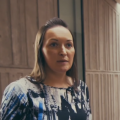
Louise O’Kane, Community Places[Essential Partners’] technique is used to explore contentious or divisive issues. So looking at renewable energy we thought this was an ideal opportunity to explore all the complexities of that issue. I found it a really useful method, and although this is the first time we’ve used it I am sure we’ll be using it again.
Northern Ireland, UK

Megan DeFranzaHere safe space was created for pastors and church leaders to wrestle with topics like evolution which are all too often “off limits” or believed to be antagonistic to the faith.
Gordon College, Massachusetts

Undergraduate StudentI notice that my classmates take much more care when speaking about people who practice other religions. They make fewer assumptions, and they’re more careful with their words to make sure to avoid unintentional connotations.
Bridgewater College, Virginia

Parent, Cary AcademyEssential Partners's dialogue initiative is, literally, the best forum I have attended during my time at Cary Academy. The openness and sharing in our group led to genuine connections. I’m not sure words can express how meaningful this event was to me. Truly priceless.
Cary, North Carolina

Veronique Cavaillier, Director of Eastern Trade CouncilI think Essential Partners' training should be mandatory in every legislature. I think it should be a requirement.
The Council of State Governments

Program ParticipantThis is a different tool for engagement. It’s not about you, it’s about others. It involves the art of listening and sincerely talking from the heart
Interfaith Mediation Centre, Nigeria

Noga Shemer, Associate Professor in Anthropology“When I started bringing the RSD model into the classroom, it changed everything, and I had this overwhelming sense of what the classroom could be. The student feedback was unlike anything I had seen before. Students said, ‘Wow, why haven’t we had the chance to do this before? And why don’t we get to do this more often in our education?’”
University of Connecticut

Romeo McCauley, Project PartnerI learned that I can build relationships, that I can be connected to anybody who I want to be connected to, no matter how difficult it is
Liberia

Program ParticipantThis is a new idea, so many people speaking from their hearts. People can come together...if people can understand, they can change their hearts; then this can bring about more change.
Interfaith Mediation Centre, Nigeria

Program ParticipantThe highlight for me was the interconnectedness of the participants’ views, mutual respect, and range of experiences within the group
Montana

Lucinda Garcia, Researcher, Educator & AdvocateThe Dialogic Pedagogy Fellowship at Tufts University, in collaboration with Essential Partners, gave me transformative social-emotional learning and facilitation skills to support meaningful dialogue in the classroom. I’m excited to apply what I’ve learned to design questions that invite personal narratives, value-based discussion, and comfort with complexity—all in service of building a classroom climate where productive dialogue and engaged learning can flourish.

Janele Nelson, Mission DirectorIn these divisive times, Essential Partners has given my local YMCA and now the national YMCA a means to build bridges through dialogue, re-establishing foundations for constructive change to occur.
YMCA of Pierce & Kitsap Counties (WA)

Bob Bordone, Expert and AuthorEssential Partners does the best work in the field of dialogue and communication.
Harvard Negotiation & Mediation Clinical Program, Co-Founder

Program ParticipantThis is the best adult learning experience I have had in the past five years. I wanted to learn new skills—I did!

High School StudentSimply changing the wording of a question can invite a completely different personality and emotion around a question. You can learn so much more and have a better understanding of someone's perspective by changing your question.
Raleigh, NC

Jordan Cuffee ’21The dialogue training allowed me to push myself to speak up first. In an informal conversation, I’m not usually the first person to voice my opinion; I usually end up listening, rather than taking a stance on sharing my opinion. But the dialogue training empowered us to decide if we want to say something now or listen. It really made me feel part of the conversation, rather than being on the outside, observing.
Cary Academy, NC

Undergraduate StudentWe tackled really difficult topics and this helped everyone know each other and understand each person's individual perspective. Over the course of the semester, I became much more comfortable engaging with my classmates—specifically because of the peer dialogue groups.
Bridgewater College, Virginia

Undergraduate StudentI started to trust everyone in the class—I felt heard and I felt that people wanted to listen. As a result, I wasn’t afraid to let my past come out and let people learn from what I have been through.
Bridgewater College, Virginia

Elizabeth Zehl, Undergraduate StudentEssential Partners' process gives people the space to be intellectually curious and to engage with others on important issues in a way that also benefits their own understanding of what they believe.
Randolph College (VA)

Linda Gryczan, MediatorInstead of demonizing and dehumanizing the other, we built a deeper connection. The fact that we disagree matters much less. It matters much more that we are neighbors in this community.
Montana Mediation Association

Program ParticipantI read this comment from the 14th Dalai Lama: "Every change of mind is first of all a change of heart.” It seems appropriate for what we are doing.
Bayview, Michigan

High School StudentIt honestly surprised me that we were doing [dialogues about the 2020 election] in the first place. I have gone to this school since Kindergarten, and I have seen the recurring pattern of the faculty and staff looking to keep politics out of school discussion, which is completely understandable. Growing up this way has built a sort of stigma around politics that I feel like affected my experience in these activities. This also prompted me to learn more about how I feel about these topics.
North Carolina

Anjali Bal, Associate Professor of MarketingWe talked about where we are in the world right now, so we talked quite a bit about polarization. Essential Partners showed how these conversations are becoming more taxing and challenging because of that polarization. These were some first steps in terms of how we can start to have those conversations.
Babson College, MA

Program ParticipantI did not anticipate having as many concrete takeaways as I do. I feel there is an immense practical application.

Program ParticipantThis is a new idea, so many people speaking from their hearts. People can come together...if people can understand, they can change their hearts; then this can bring about more change.
Interfaith Mediation Centre, Nigeria

Misty Stoll, School Board TrusteeThe Sheridan Community has changed in the best way since the Essential Partners training. The Center for a Vital Community has been holding monthly dialogues. I’m going to facilitate the upcoming one. What’s great is that we’re attracting a much more diverse group of participants. There are always the regulars who come, but now we’re also getting conservative Republicans to come as well—politicians come, even the Sheriff comes.
Wyoming

Secondary School TeacherI’m a world history teacher… now I feel I’m more empowered about how to make connections across differences. I have a better skill set to facilitate connections.
New York City

Meirav Solomon ’20Dialogue not only teaches you how to interact and understand more deeply those around you, it also teaches you more about the world around you and yourself. I think dialogue is super important to my growth as a student, a global citizen and a human being. I have learned to listen, I have learned to speak out, I have learned how to access my stretch zone (where I feel uncomfortable speaking but not turned off) and I have learned where my limits are.
Cary Academy, NC

James Rucker, Faculty MemberIt is really different than it was before. The Essential Partners process has given me the power to be heard and be seen. It’s unreal.
Randolph College (VA)

Patrick Hale, director of Multicultural and Identity ProgramsOne of the things that’s so crucial to even fostering dialogue around diversity, equity, and inclusion is creating opportunities for folks to engage in deep reflective self-awareness.
Babson College, MA

Imam Sani IsahThrough this training, we will have more people in the stream of work that we do and become better equipped with the know-how, skills and techniques. But most important, together we will sow a seed that will germinate and become a source of the antidote to terrorism, fanaticism, bigotry and extremism.
Nigeria

Meirav Solomon ’21Vulnerability is the key. A lot of perspective-taking is based in vulnerability. It’s the key ingredient in a good structured dialogue. It’s crucial to the ‘meet me in the middle’ experience that dialogue is all about.
Cary Academy, NC

Jamie Kleinman, Associate Professor“I want every STEM class to have a dialogue. Imagine if the students had more practice doing this in more of their classes. It really speaks to the nature of approaching this from a systems perspective and how big a need there is for that.”
Department of Psychological Science, University of Connecticut
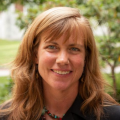
Dr. Jill DeTemple, Religious Studies FacultyAfter using this approach in my classroom, I am now more willing, and more able, to engage students in meaningful conversations about potentially contentious issues. Whereas I used to nod toward things like homosexuality in religious life, interfaith marriage, or the role of government in reproduction, now I build these conversations into the class so students can learn to speak about their experiences, and so they learn to listen and learn from those with whom they might disagree.
Southern Methodist University, Texas

Member of the CongregationI cannot possibly walk out of this experience and help being a different person. I feel that my own experience has been life-changing.
Glendale Presbyterian, California

Linda Gryczan, MediatorInstead of demonizing and dehumanizing the other, we built a deeper connection. The fact that we disagree matters much less. It matters much more that we are neighbors in this community.
Montana Mediation Association

Kate CellThe thing that always feels like magic to me—and I’ve used it in several meetings that I’ve had since—is how the practitioners start by setting out pacts or agreements.
Union of Concerned Scientists, Massachusetts

Program ParticipantThere should be opportunities throughout the [Anglican] Communion for ongoing structured conversations regarding difficult issues. These should engage persons at all levels within and between Provinces and should be guided by agreed covenants similar to those that have assisted our conversations.
Anglican Community & Human Sexuality Retreat

High School StudentI learned that through productive dialogue, you can make relationships and friendships with people through talking about your differences and similarities.
Newburyport, MA

Lauren Cobb, Task Force MemberI now lead teams with a different language, using different processes, and with a different awareness of team dynamics. [I’ve seen] relationships grow and deepen, unity and commitment remain high, and mutual respect established and fostered.
Glendale Presbyterian Church, California

Anjali Bal, Associate Professor of MarketingOne of the things that we talked about was the ability to hear another person’s point of view, even if our minds aren’t changed. We have to remember that any sort of movement is movement. If we don’t acknowledge small movement, then we just stay on two different sides, and it’s all black and white, and we don’t hear each other.
Babson College, MA

Undergraduate StudentThe most significant thing for me was learning how to ask for more information rather than trying to persuade a person to think differently. I also learned helpful dialogue tips, which are more effective during difficult conversations. If I encounter a difficult dialogue with any of my residents, I plan on using the techniques I learned in this workshop to facilitate those talks.
Northeastern University, MA

Douglas Stone, Sheila Heen, and Bruce PattonWe owe a debt of gratitude to Laura Chasin and her collaborators at Essential Partners… From them, we have learned about the transformative power of telling one’s story and speaking to the heart of the matter.
Difficult Conversations

Undergraduate StudentIt’s nice to talk about things that we encounter all the time but rarely get talked about. This made me hopeful that there are people who are willing to talk about serious issues.
Dartmouth College, New Hampshire

Undergraduate StudentI notice that my classmates take much more care when speaking about people who practice other religions. They make fewer assumptions, and they’re more careful with their words to make sure to avoid unintentional connotations.
Bridgewater College, Virginia
